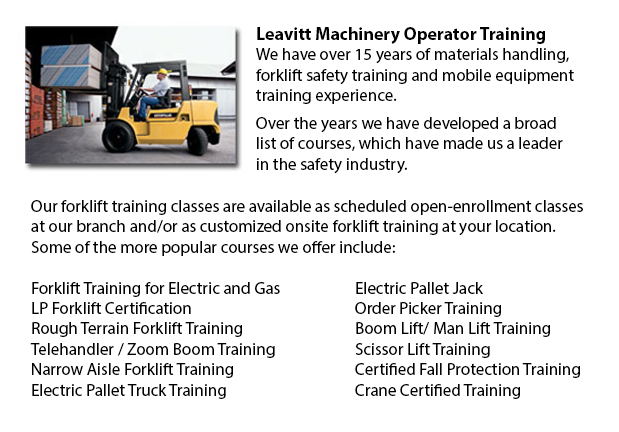
Forklift Certification Schools Richmond Hill - Forklift Certification is mandatory in North America. Hence, forklift training programs are important both for companies and for people seeking jobs in industries as forklift operators. Forklift training focuses on health and safety concerns involved in making use of forklifts. Safety issues affect both the operator of the forklift and employees and other people who are in the vicinity of the forklift. Businesses can be subject to penalties if they are caught with un-certified operators during an inspection. There are several convincing reasons why businesses have to comply with forklift standards.
Before the employee or trainee is certified to drive a forklift, nearly all provincial, federal and state regulations would require the worker undergo an evaluation of the skills essential for forklift safety. There are various forklift certification schools providing courses for workers and there are likewise schools which offer on line forklift training. However, employers should be aware that forklift certification training is not "just a test". Correct forklift training must comprise some fields of study, such as theory and hands-on practice. Rules do not need employers to have an outside organization to certify forklift operators.
The suggested curriculum for a quality forklift certification service involves both classroom training and an on-site component. Classroom training normally features informative sessions with videos, power point presentations, models and discussions. Students normally should write a test to check for subject matter understanding. Certificates of completion are given upon successful completion of the class.
The use of the equipment evaluation needs the trainee to understand the job site hazards, pre-operational machine check, a pass/fail operational test and operational instruction.
Training typically covers the following subject areas: Understanding legislations and regulations; Controls & Instrumentation; Engine Operation and Maintenance; maneuvering and Steering; Fork and Attachment Restrictions, Visibility; Rated Capacities, Stability, Maintenance & Inspection; Load Manipulation; Refueling; Pedestrians, and Dangerous Places & Rough Terrain Operation. Furthermore, there are training courses available for workers who are transitioning to new job positions.
-
Scissor Lift Certification Richmond Hill
Scissor Lift Certification Richmond Hill - Scissor lift platforms are utilized at work sites in order to allow tradespeople - like for example welders, masons and iron workers - to reach their work. Operating a scissor lift platform is usually second... More -
Narrow Aisle Forklift / Order Picker Training / Electric Pallet Jack / Electric Pallet Truck Training in Richmond Hill
A pallet jack is a model of equipment specialized in the transporting of pallets of many dimensions and weights. They might be utilized as an appendage for lift trucks, cranes and other types of heavy machinery or be used on their own. Pallet jacks a... More -
Heavy Equipment Operator Certification Richmond Hill
Heavy Equipment Operator Certification Richmond Hill - The heavy equipment operator is a person who manipulates the controls and drives various kinds of big machinery. Heavy machinery is most frequently used on construction sites in order to deliver... More -
Loader Training Richmond Hill
Loader Training Richmond Hill - Why You Must Finish A Loader Training Course - Individuals wanting work in businesses that use lift trucks must undergo a Loader Training program prior to becoming a certified operator of a lift truck. There are lots o... More -
Manlift Training Richmond Hill
Manlift Training Richmond Hill - Various manlift training programs consist of the review and content of manlift devices. An important part of the course is the practicum where students show their knowledge and practical ability to safely operate a ma... More -
Fall Protection Training in Richmond Hill
There are many injuries at work associated to falling and a lot of fall-related deaths reported every year. Most of these instances could have been prevented with better training, better measures in place, and by correctly equipping personnel before... More -
Wheel Loader Training Richmond Hill
Wheel Loader Training Richmond Hill - Commonly, the various kinds of heavy equipment training are classed into 2 categories of machinery: those which have rubber tires and tracked vehicles. Tracked vehicles consist of items like cranes, bulldozers an... More -
Heavy Equipment Certification Richmond Hill
Heavy Equipment Certification Richmond Hill - Big pieces of machines and heavy-duty vehicles are often called heavy equipment. This broad term includes utility vehicles from agricultural and forestry implements to civil engineering vehicles, construc... More

Forklift Training Richmond Hill
TOLL FREE: 1-888-254-6157
Richmond Hill, Ontario
forklifttrainingrichmondhill.com
Email Us
About Us


